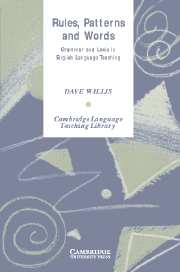Book contents
- Frontmatter
- Contents
- Acknowledgements
- 1 What is taught may not be what is learnt: Some preliminary questions
- 2 Grammar and lexis and learning
- 3 Developing a teaching strategy
- 4 The grammar of structure
- 5 The grammar of orientation: The verb phrase
- 6 Orientation: Organising information
- 7 Lexical phrases and patterns
- 8 Class: The interlevel
- 9 The grammar of spoken English
- 10 A final summary
- References
- Subject index
- Name index
1 - What is taught may not be what is learnt: Some preliminary questions
Published online by Cambridge University Press: 03 May 2010
- Frontmatter
- Contents
- Acknowledgements
- 1 What is taught may not be what is learnt: Some preliminary questions
- 2 Grammar and lexis and learning
- 3 Developing a teaching strategy
- 4 The grammar of structure
- 5 The grammar of orientation: The verb phrase
- 6 Orientation: Organising information
- 7 Lexical phrases and patterns
- 8 Class: The interlevel
- 9 The grammar of spoken English
- 10 A final summary
- References
- Subject index
- Name index
Summary
Whenever we do anything in the classroom we are acting on our beliefs about language and language learning. If we ask learners to listen and repeat a particular sentence, we are acting on the belief that such repetition is useful enough to justify the valuable classroom time it takes up, perhaps the belief that it helps rote learning which in turn promotes general language learning. If we give learners grammatical rules or encourage them to discover rules for themselves, we are acting on the belief that rules make a valuable contribution to language description and that this kind of understanding helps promote learning.
Our beliefs about language learning and teaching are shaped by our training, but also by our classroom experience. Unfortunately, learning from experience is not always easy. Teaching is such an absorbing business that it is difficult to stand back and ask appropriate questions about what is happening in the classroom.
My own experience as a language teacher – and also as a learner – suggests to me that learning a language is a much more complex and difficult process than we would like to think. We need to look very carefully at some of the assumptions we make about language learning and about language itself. A first step is to look at what happens in classrooms, and to identify some of the questions that need to be asked.
In the classroom teachers often act on the assumption that language learning is a matter of learning a series of patterns or structures.
- Type
- Chapter
- Information
- Rules, Patterns and WordsGrammar and Lexis in English Language Teaching, pp. 1 - 27Publisher: Cambridge University PressPrint publication year: 2003

